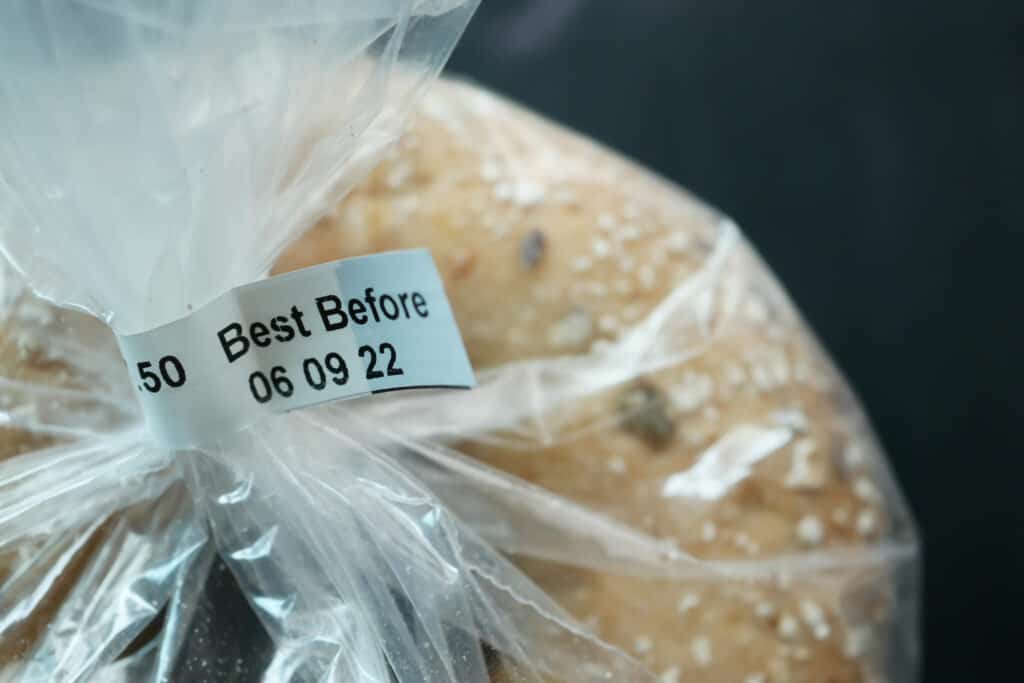You can help bread last after the expiration date. Bread does not last long and gets moldy and stale quickly.
In short, bread lasts for a few days after its expiration date. Depending on when it was baked and how it is stored it might be good several weeks after its expiration date if kept frozen. Any bread that has grown mold or has a bad odor is not good to eat, even if it has not expired.

Not all bread is equal, and some last significantly longer than others. However, if you buy bread from a store, the expiration date should indicate how long it will last before it goes bad. Is this expiration date accurate to the longevity of bread? How long will bread last after this expiration date? Let’s find out!
How Long Does Bread Last After Its Expiration Date?
No bread lasts for a long time on its own. Bread is made from simple ingredients that do not have a particularly long shelf life, which is why any store-bought bread has an expiration date that indicates how long the bread should last before it goes bad.
However, what if your bread is close to expiring, but you still want to use it or eat it? How long will bread last after its sell-by date?
The reality is that the expiration date of bread is not always accurate, and even after the bread passes its expiry date, it may remain edible for a while.
The longevity of bread is not based on the expiration date printed on the package. It depends on how the bread is made, the ingredients in the bread, and, most importantly, how the bread is stored before it is eaten.
There are bread storage methods that allow the bread to be stored for a very long time without going bad, and there are storage methods that cause bread to go stale and moldy far more quickly.
That said, bread can last up to seven days after its best-by date, depending on where and how it is stored. If the right methods are used, bread may even last several weeks after its use-by date.
Regular bread will last for a few days on the counter after it has expired, provided it is stored in a dry place away from humidity, moisture, heat, and out of direct sunlight. Homemade bread and bakery bread do not always last as long as store-bought bread, but the shelf life of the bread is roughly the same if it is stored correctly.
Is It Safe To Eat Bread After Its Expiration Date?
If you have accidentally allowed the bread to live on past its expiry date, is it still safe to eat, or is it a health risk?
It is safe to eat bread that has passed its sell-by date so long as it has no visible mold. Bread that has passed its expiry date is likely to be stale and dry, but it is still safe to consume so long as it has not grown mold and has not gone bad.
Bread that has passed its expiry date is not inherently bad for you, and it may just not be as delicious or fresh tasting as bread that has not reached this point.
It is only unsafe to eat bread if it has gone bad or has begun to rot. This bread can breed bacteria and can be harmful if ingested. However, even bread that has passed its expiry date is usually safe to eat, within reason.
Bread that has become a little stale or hard due to being a little old is not harmful to eat, and it can be made softer with some moisture.
If your bread has expired, always check it for mold, green spots, or discoloration. If it does not have any of these, it should be safe to ingest.
How To Tell If Bread Has Spoiled
Bread does expire and go bad, but the expiry date of a loaf of bread is not always the best way to determine whether or not it is safe to eat. Bread can sometimes last longer than its expiry date, depending on how it is stored, so how do you tell if bread has gone and is no longer safe to eat?
Any bread has gone bad if it demonstrates signs of mold, decay, or discoloration or if it has anything growing on or within it.
Bread can be a breeding ground for mold and bacteria due to the yeast it contains, and when it goes bad, it will begin to grow things that are unsafe to ingest, and these nasty growths and organisms will be visible on and within the bread.
When bread has passed its expiry date, it may still be safe to eat, but if it begins to go moly, stale, discolored, or breed life, it is no longer safe to ingest.
Moldy bread is no longer food safe, and it should be discarded.
Other signs that could indicate that bread has gone bad and should not be eaten include a bad smell, dark spots, holes in the bread that are not meant to be there, and even colored spots of reds, greens, pinks, or purple, all of which indicate mold growth.
How To Make Bread Last Longer Than Its Expiration Date
Bread does not always spoil as soon as it passes its expiry date, and it can be kept far longer than its expiry date so long as it is stored in the right conditions. Knowing how to keep bread fresh in storage for a long time is essential to minimize food waste and make your food last longer.
The best way to keep any bread fresh and safe to eat longer than its expiry date is to freeze it in tight plastic wrap, a zip-top plastic bag, or an airtight container.
You can freeze an entire loaf or freeze the bread in sections or slices that can be defrosted when you are ready to eat them.
Keeping the bread in the freezer stops mold from growing on the bread, reduces staleness, and ensures that the bread will remain safe to eat and delicious for as long as possible.
Bread stored in a freezer can last several weeks past its expiry date and remain perfect for eating and completely safe.
Bread that is stored at room temperature will end up going stale, bread that is kept in an area that is too warm or that has too much moisture or humidity will grow mold, and bread that is kept in the fridge will get hard and dry very quickly.
However, bread stored well in the freezer will remain good for a long time and can be defrosted and enjoyed at nearly the same level of freshness as when it was frozen, regardless of its expiry date.
The freezer is the ideal place to store bread for a long time, but some other storage methods can help bread last longer, perhaps even longer than its expiry date indicates.
These methods include the following:
- Keep the bread out of direct sunlight.
- Keep the bread out of warm and cold environments.
- Store the bread away from moisture and humidity.
- Store the bread in a breathable container such as a bread bin or reusable bread bags.
- Never put bread in the fridge unless you want stale bread.
If you intend to keep a loaf of bread longer than its expiry date, always monitor it for signs of going bad, and always check it for these signs before eating any, even if the bread has been kept frozen.
Can Bread Go Bad Before Its Expiration Date?
We have established that bread can be kept longer than its expiry date, but is it possible for bread to go bad before it reaches this date?
Bread can go before its printed expiry date. If this happens, the bread is unsafe to eat after the expiry date and will not last longer than the best-before date.
Bread can go bad before its expiry date if kept in an environment or location that causes it to grow mold, go stale, or decay more rapidly.
Anywhere that is too hot, too cold, too moist, too humid, too dry, or anywhere that has no airflow can cause the bread to go stale, grow mold to go bad more quickly.
This is true for all types of bread, regardless of how it is made and what ingredients go into it.
Bread needs to be stored between 60°F and 80°F, in low humidity, out of direct sunlight, and in an area with some airflow to prevent the bread from staying too moist and growing mold.
If these parameters are not met, the bread will likely go bad before it reaches its expiry date. This is not uncommon and leads to a lot of food waste in many homes.
Bread should always be eaten quickly, usually within a few days of purchase or baking. If bread is not eaten within a few days, it should always be frozen to ensure that it lasts for as long as possible without spoiling.
Bread that goes bad before its expiration date was likely not stored well before purchase or has been stored for too long at the store or bakery.
This is an unfortunate but common reality and is the reason why some loaves of bread seem to go bad more quickly than others, even when stored in the same environment or location.
How Long Should Bread Usually Last?
Bread is not a long-life product and is not made to last for a long time. Different bread types last longer than others, but no bread is made to be a long-lasting food. With that in mind, how long should bread last, and how long should it last after its expiry date?
Bread with higher fat content and unleavened bread lasts longer than lean bread and leavened bread. Unleavened bread can last many more days than leavened bread, and bread made with butter or oil will usually stay fresher for far longer than basic breads.
This means that different bread types last longer than others, but all bread eventually spoils in some way.
With that said, bread should usually last for around five days before it goes stale, it can last for around ten days without growing mold if it is stored correctly, and it can last for several weeks when frozen.
Bread spoils fastest when it is kept on the counter, and it can be stored for longer if kept in an ideal environment, such as within a pantry. Bread can be stored for a very long time when frozen, as it will not lose moisture nor grow mold in this freezing environment.
The expiry date printed on store-bought bread is usually around a week or ten days after it was baked, depending on how it is stored. This means that bread that is not frozen does not have much longer to last after its printed expiry date.
Before being consumed, any bread that reaches its expiry date should be inspected for signs of decay, staling, and mold.
Conclusion
Bread is unlikely to last for a long time after it has reached its expiration date unless it is stored in optimal conditions or kept in the freezer. Bread stored this way is likely to outlast its expiration date, but it will not last forever and will likely go dry regardless of how it is stored.
Bread is good to eat so long as it is not decaying, has no mold, and does not have a bad odor. Always inspect bread that has passed its expiration date for these before consuming it, and be sure to store bread well to keep as fresh and tasty as possible for as long as possible.
